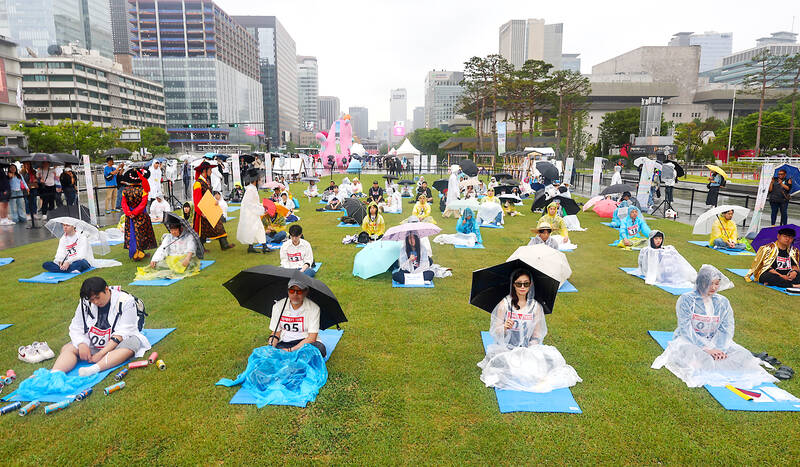In downtown Seoul, in front of the iconic Gyeongbokgung palace, dozens of people of all ages sit on wet yoga mats, staring into space. Some are dressed in doctors’ and dentists’ uniforms, while others wear the attire of office workers and students. Welcome to the international “space-out competition”.
The rules are simple: do absolutely nothing. Falling asleep, however, leads to disqualification. Organizers monitor the participants’ heart rates; the contestant with the most stable heart rate wins.
Started in 2014 by local artist Woopsyang, the space-out competition has grown in popularity over the years. Described as visual art, the performance aims to create a mini-city of people doing nothing amid those busy at work, driving home the message that doing nothing is not a waste of time.

Photo: EPA-EFE
South Korea is known for its punishing work culture, with some of the longest hours in the developed world. Despite the introduction of the 52-hour weekly work limit in 2018, overwork and exhaustion are still not uncommon. The government last year proposed to increase the maximum weekly working time to 69 hours, sparking a severe backlash and eventual backdown.
Students too face high levels of stress, living with the so-called “education fever,” characterized by long hours of study and the attending of private academies in the hope of attending a prestigious university and getting a job at one of the country’s top companies.
A 2022 government survey targeting 19-34-year-olds found that one in three young people had experienced burnout in the past year, with reasons cited including career anxiety at 37.6 percent, work overload at 21.1 percent, skepticism about work at 14.0 percent, and work-life imbalance at 12.4 percent.
Against this backdrop, Sunday’s event was a chance to take a break from it all. The competition has previously been held in cities such as Tokyo, Taipei, Beijing and Rotterdam. Participants this year came from home and abroad, including France, Nepal, South Africa, Vietnam, and Malaysia.
The rain did little to deter the participants, most of whom used umbrellas and disposable ponchos. Some lay flat on the ground, gazing at the sky, while others assumed meditative positions. Several wore traditional Korean attire, including a ‘gat’ hat, a symbol of high society during the pre-industrial era, when leisure time was often associated with the nobility and literati.
“In a way, this makes conditions ideal to space out,” the host remarked.
First-place winner Valentina Vilches, originally from Chile but residing in South Korea and working as a psychology consultant, said she came to have fun but also wanted to share her experience with her patients.
“I want to remind them about the importance of spacing out and relaxing and how this positively affects your mental health,” she said after receiving her golden trophy in a shape inspired by Rodin’s The Thinker and the Pensive Bodhisattva, a South Korean national treasure.
Kim Ki-kyung, a South Korean office worker who was nearly late to the event after being made to work on Sunday morning, said it was a small opportunity to take a breather.
“Korean society is very competitive, so sometimes doing nothing is essential,” he said.
“I think we’ve forgotten how to do that.”

In the March 9 edition of the Taipei Times a piece by Ninon Godefroy ran with the headine “The quiet, gentle rhythm of Taiwan.” It started with the line “Taiwan is a small, humble place. There is no Eiffel Tower, no pyramids — no singular attraction that draws the world’s attention.” I laughed out loud at that. This was out of no disrespect for the author or the piece, which made some interesting analogies and good points about how both Din Tai Fung’s and Taiwan Semiconductor Manufacturing Co’s (TSMC, 台積電) meticulous attention to detail and quality are not quite up to

April 21 to April 27 Hsieh Er’s (謝娥) political fortunes were rising fast after she got out of jail and joined the Chinese Nationalist Party (KMT) in December 1945. Not only did she hold key positions in various committees, she was elected the only woman on the Taipei City Council and headed to Nanjing in 1946 as the sole Taiwanese female representative to the National Constituent Assembly. With the support of first lady Soong May-ling (宋美齡), she started the Taipei Women’s Association and Taiwan Provincial Women’s Association, where she

Chinese Nationalist Party (KMT) Chairman Eric Chu (朱立倫) hatched a bold plan to charge forward and seize the initiative when he held a protest in front of the Taipei City Prosecutors’ Office. Though risky, because illegal, its success would help tackle at least six problems facing both himself and the KMT. What he did not see coming was Taipei Mayor Chiang Wan-an (將萬安) tripping him up out of the gate. In spite of Chu being the most consequential and successful KMT chairman since the early 2010s — arguably saving the party from financial ruin and restoring its electoral viability —

It is one of the more remarkable facts of Taiwan history that it was never occupied or claimed by any of the numerous kingdoms of southern China — Han or otherwise — that lay just across the water from it. None of their brilliant ministers ever discovered that Taiwan was a “core interest” of the state whose annexation was “inevitable.” As Paul Kua notes in an excellent monograph laying out how the Portuguese gave Taiwan the name “Formosa,” the first Europeans to express an interest in occupying Taiwan were the Spanish. Tonio Andrade in his seminal work, How Taiwan Became Chinese,